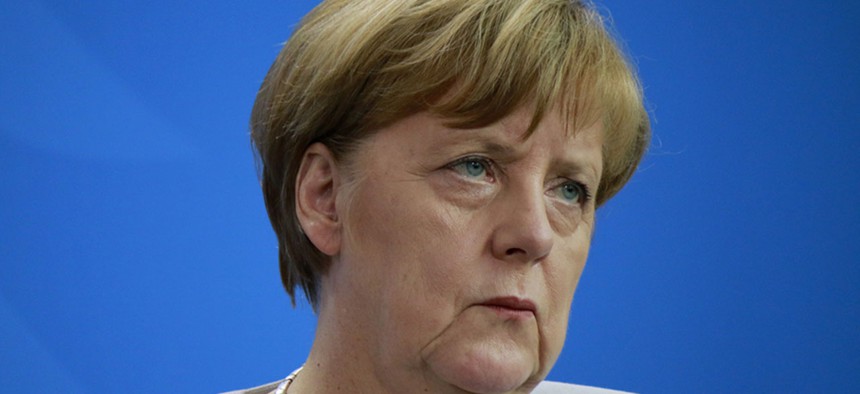
Angela Merkel said that the election “inflicted deep wounds that will not be easy to close.” 360b / Shutterstock.com
World Leaders Are Awkwardly Congratulating Donald Trump
"I want to sugarcoat anything. Nothing is easier, much will be difficult," said Angela Merkel.
Heads of state and world leaders have been congratulating Trump on his election victory, but with varying degrees of sincerity.
The Philippines’ Rodrigo Duterte, who has been outright hostile to both Barack Obama and to Trump, was respectful:
JUST IN: Duterte congratulates Trump on his US election win @gmanewsbreaking pic.twitter.com/cOB752xPrC
— Trisha Macas (@trishamacas) November 9, 2016
Donald Tusk, president of the European Council, was equally respectful, despite how Trump has been openly sympathetic towards Brexit. Towards the end of his generally deferential letter, in which he called to “strengthen translatlantic relations,” Tusk invited Trump to a US-EU summit “at your earliest convenience.” In other words, we need to talk, now. European far right leaders, in stark contrast to Tusk, were jubilant.
Sinaporean Prime Minister Lee Hsien Loong directly compared Trump’s victory to Brexit, noting that it “reflects deep frustration with the way things are, and a strong wish to reassert a sense of identity…” His message, while neutral, contains an air of resignation—perhaps reflecting a preference for Hillary Clinton, whose held a more predictable stance towards China and intervention in the South China Sea.
Other world leaders showed less neutrality in their remarks.
France’s Francois Hollande congratulated Trump on his victory, while adding that his upcoming presidency “now opens a period of uncertainty.” This marks a relative contrast from his comments in August, when he said Trump’s comments about Muslims made him “want to retch.”
Sweden’s Stefan Löfven didn’t even mention Trump’s name in his statement. The prime minister has previously criticized his presidential bid, calling it “based on fear and division. Hate, I would almost say, or at least antipathy.” His note after Trump’s victory can barely be called congratulatory:
This is an election outcome that many people feel concerned about but that we have prepared for.
Sweden has a long tradition of cooperation with US governments, regardless of party political affiliations, and the Swedish Government will contact the administration that takes office at an early stage to safeguard Swedish and European interests, and to promote global security and stability.
Germany’s Angela Merkel was even more direct. She said that the election “inflicted deep wounds that will not be easy to close,” and hinted at a growing division (link in German) between the United States and Europe:
Trump has found in the course of the election campaign critical words not only to Europe but also to Germany. I think we have to face it that American foreign policy will be less predictable for us, and we must be sure that America will be inclined more often to decide alone.
She began the closing of her speech on a dour note: “I don’t want to sugarcoat anything. Nothing is easier, much will be difficult.”
South Korea perhaps had the most telling response to Trump’s victory. Around the time the office of president Park Geun-hye sent Trump a congratulatory note, its National Security Council convened for an emergency session. It’s possible it’s not the only country to do so.
Isabella Steger and Steve Mollman contributed to this piece.






